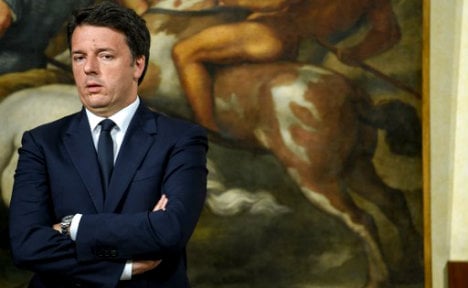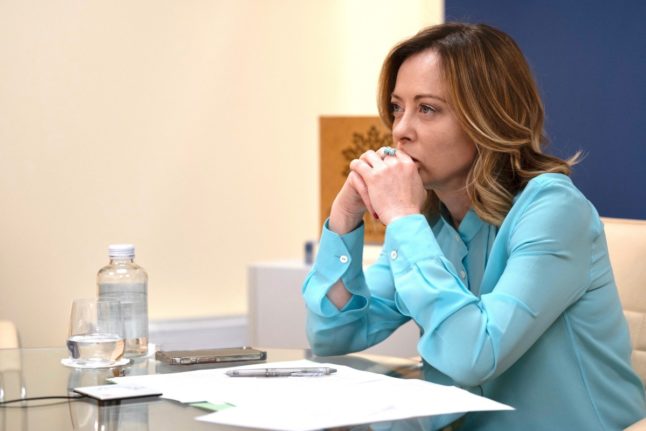The ''Yes' or 'No' referendum on which Renzi is betting his political future intends to bring about reforms that would streamline Italy's political system, which basically means getting laws passed quickly and stabilizing future governments.
The reforms are much-needed. But now the important decision has been left in the hands of Italians after parliament failed to reach the maximum support required to avoid sending it to a public vote.
The problem is, with many failing to grasp Italy's complex political systems, the vote could be a chance for people to simply say “Yes” or “No” to Renzi as the country's leader.
Renzi stepping down would undoubtedly pave the way for the eurosceptic Five Star Movement, the second-biggest party in parliament, to gather even more ground.
Candidates from the anti-establishment party were recently elected mayors for Rome and Turin, while founder Beppe Grillo has long called for a referendum on Italy's membership of the euro, which, if it actually came to pass, would have disastrous effects on Italy's economy as well as threaten the EU's future.
So what's it all about?
The referendum comes as the government tries to force through legislation which will dramatically reduce the size and influence of the upper house of parliament, or senate.
If the changes are passed, the number of senators will be slashed from 315 to a mere 100. Unlike today, the senators will not be directly elected, but hand-picked by the government from local councils across the country.
“The current system is imperfect, as both houses have equal lawmaking powers,” Gaetano Azzariti, professor of constitutional law at Rome's Sapienza University told The Local.
“As many have rightly pointed out, it makes lawmaking slow and laborious.”
Proponents of the changes say they will stop legislation from bouncing endlessly between the upper and lower house, reduce political costs and stabilize the government.
“At the moment a government must hold a majority in both houses to stay in power,” Azzariti said, explaining that in the last 71 years, just one government of a total of 63 – Silvio Berlusconi's fourth – has successfully reached the end of its mandate.
Although parliament voted in favour of proposed changes last year, only 360 of the country's 630 MPs supported the move. Italian law states that the country's constitution can only be automatically changed following a two-thirds majority or the issue must go to popular vote.
The idea has been branded 'undemocratic' by opponents across the political spectrum, with the strongest criticism coming from the Five Star Movement's Grillo.
Despite their youth and lack of formal structure, which sees candidates chosen from grassroots activists who organize meet-ups via the internet, M5S are now the PD's main rivals at the polls.
But it's not just politicians who oppose the changes – noted academics and even high-profile celebrities such as Roberto Benigni have spoken out against curbing the influence of the senate.
“The changes would practically guarantee future elected governments would hold the majority for five years, which would dramatically concentrate power into the hands of a few,” Azzariti explained.
A high-stakes bet
Much like his UK counterpart David Cameron did at last month's EU referendum, Renzi has gambled his political future on the outcome of a vote, which is now threatening to blow up in his face.
“It's not written anywhere that Renzi needs to step down if a 'No' is returned, but that is what he has promised,” Azzeriti said. In making the threat Renzi hopes voters will choose stability over the uncertainty and chaos caused by the need to form a new governmnet.
“As many people have pointed out, this decision has perhaps personalized the vote too much,” Azzeriti said.
With the reform already coming under criticism for its political implications, Renzi's brinkmanship has handed his detractors a silver bullet at the ballot boxes where they can now simply vote 'No' and send him home.
“I think the proposed changes will make our governments stronger and allow them to achieve more so I will definitely vote 'Yes' come October,” Nicola, a 53 year old anti-mafia investigator in Rome told The Local during his lunch-break.
“The problem is the vote has turned into something else entirely and is more about Renzi's future now” he added.
“You're right,” laughed his 52 year-old colleague Mario, who normally votes for the centre-right parties and has little time for the left-wing PD.
“I'm not really interested in what happens to the senate, but I'll definitely be voting 'No' to try and get Renzi out.”
Defeat on the cards?
If protest voters like Mario all turn out in October with the hope of bringing down the government, the reforms stand no chance, yet Renzi has shown no signs of backing down on his threat.
Back in April, polls suggested a comfortable, 62 percent 'Yes' victory was on the cards, but the latest polls from EuroMedia Research in June now give the 'No' campaign a 53.6 percent lead.
While such polls are not to be trusted, the sudden change in attitudes reflects the opinions expressed by voters local elections last month, when the PD was handed its heaviest blow since Renzi came to power two and a half years ago.

Five Star candidate, Virginia Raggi, became Mayor of Rome last month. Photo: Alverto Solaro/AFP
“I hope voters consider the political implications of the issue before casting their vote,” Azzariti explained, “but constitutional reform is a dry and complex topic.”
“The government has a lot of canvassing to do and can either make the political facts clear or resort to empty slogans…either way, I wouldn't want to make any predictions about how the vote will go.”
All to play for
“It's tricky and I haven't made my mind up yet,” 19-year old student Tatiana told The Local at a bookstore in central Rome. “I'm not really sure I know which political party I support let alone enough about politics to make the 'right' choice.”
Her friend Alessandra, also 19, tentatively supports M5S, but has not yet exercised her recently acquired democratic rights.
“It's hard to understand what the implications of a 'Yes' or 'No' vote will actually entail. Come to think of it, I'm not sure it's really something the public should be voting on,” she said. “But if Renzi goes, it won't be the end of the world.”
Should the majority of voters opt for 'No' many see M5S as best placed to take advantage following their recent gains at local level.
June polls by Demos show the party is riding a wave of popular support in Italy and has now moved ahead of the PD in terms of popularity, with 32 percent of all Italian voters declaring themselves 'Grillini'.
“Perhaps in Italy at the moment, there is a crisis among the political class and it's hard to see who the next leader of Italy could be or what party they would come from,” Azzariti added.
Certainly, if Italians vote for 'No', changes of government, for better or for worse, will remain a trademark of the country's political landscape.



 Please whitelist us to continue reading.
Please whitelist us to continue reading.
Member comments